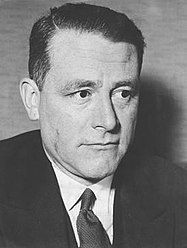On the return of Carl Schmitt chapter 12 – David French in NYT:
‘A good way to understand this terrible political morality is to read Carl Schmitt, a German political theorist who joined the Nazi Party after Hitler became chancellor. I want to be careful here — I am not arguing that millions of Americans are suddenly Schmittians, acolytes of one of the fascist regime’s favorite political theorists. The vast majority of Americans have no idea who he is. Nor would they accept all of his ideas.
One of his ideas, however, is almost perfectly salient to the moment: his description, in a 1932 book called “The Concept of the Political,” of the “friend-enemy distinction.” The political sphere, according to Schmitt, is distinct from the personal sphere, and it has its own distinct contrasts.’
(…)
‘One of liberalism’s deficiencies, according to Schmitt, is a reluctance to draw the friend-enemy distinction. Failing to draw it is a fool’s errand. An enduring political community can exist only when it draws this distinction. It is this contrast with outsiders that creates the community.
Schmitt was being both descriptive and prescriptive here. If the friend-enemy distinction is necessary to the creation and preservation of a political community, then it can be destructive to seek accommodation with your political opponents. This is human nature, and it’s naïve not to yield to our essential character.
Schmitt was partly right. The friend-enemy distinction is an aspect of human nature, and we are constantly tempted to yield to it, to rationalize it and to indulge it. Rather than resist it, we want to find some way to make it right, often simply to preserve our self-conception that we are moral and decent people.’
(…)
‘Our government is constructed with the understanding that, as James Madison famously put it in Federalist No. 51, “If men were angels, no government would be necessary. If angels were to govern men, neither external nor internal controls on government would be necessary.” The Constitution tries to ameliorate the will to power as best it can — as Madison said in the same essay, “ambition must be made to counteract ambition” — but the founders also knew that even our elaborate system of checks and balances is insufficient. To make our system work, virtue is a necessity.’
(…)
‘Any deviation from orthodoxy is perceived as evil, and evil must be utterly eradicated.
And there’s no humility in cancel culture — regardless of whether it comes from left or right.
Because our civics depends on our ethics, we should be teaching ethics right alongside civics. Sadly, we’re failing at both tasks, and our baser nature is telling millions of Americans that cruelty is good, if it helps us win, and kindness is evil, if it weakens our cause. That is the path of destruction. As the prophet Isaiah said, “Woe to those who call evil good and good evil.”’
Read the article here.
Yes, French makes same important points, but he fails to mention that progressive thinkers from Kojève to Walter Benjamin to Chantal Mouffe, took and take seriously.
The fried-foe distinction is not only deeply human, understandable, maybe also necessary. No us without a them.
It’s for good reasons that I’m not very fond of ‘us’ – of tribalism.
We should not try to overcome Schmitt, but to answer the question: how to treat your enemies? Internal and external enemies.
It’s the treatment of enemies that exposes many people as well, yes, enemies, barbarians.
And once again, the barbarian is not only in the garden, he is always in the mirror.
Benjamin: ‘There is no document of civilization which is not at the same time a document of barbarism.’
